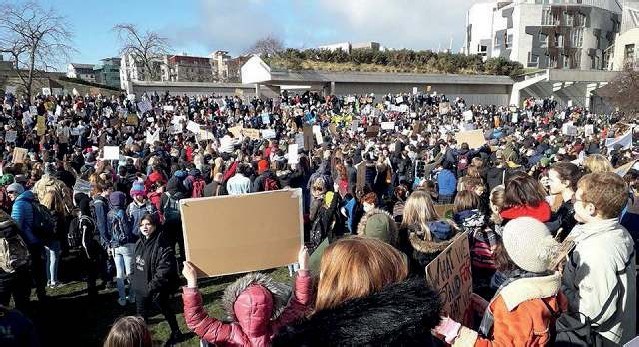‘We need drastic action now’
Heather O’Connor explains why she fears for the future.

Image © Adrian Shaw
THIS is an emergency and we are scared. So, we strike.
Since Greta Thunberg started striking from school last year and speaking truth to power, I, along with over a million other young people, have been part of a global movement demanding that our governments listen to climate scientists who have been warning of ecological breakdown for over 30 years. They have not listened, and we are now in an ecological emergency. Humanity is at a crossroads. Those in power choose whether we will live.
I have never been fully involved in activism like this before, but now I see no option. I can’t fathom bringing a child into this world when the future would be so bleak. I can’t look at the children of today without anger and sadness, knowing that the destruction of the majority of life on this planet (with current trends) is an inevitability in their lifetimes. I mourn the biodiversity that existed less than 20 years ago when I was a child playing with soil in my mum’s garden. This is largely due to the inaction of governments who prioritise, as Sadiq Khan has said we should return to, ‘business as usual’.
But, the truth is, ‘business as usual’ is what is killing life on this planet. As a Christian, I feel and know absolutely that my job is to care for the poor, impoverished, disadvantaged and marginalised. World Bank Group, in 2018, predicted that 128 million climate refugees will be created by 2050 if we do not act on climate change now. We are in the midst of the Sixth Mass Extinction in our planet’s history. 76% of our flying insect biomass has disappeared within the past 30 years.
There are decisions that are necessary to make in our lives to cut our personal footprints, like drastically reducing our meat and dairy consumption and asking ourselves whether we can acquire secondhand instead, etc. However, our system, too, must change drastically.
Our governments are not only failing us, but are actively making this crisis worse.
Carbon emissions are rising, and the UK Government has failed to meet its climate targets: which, even in themselves, are still not ambitious enough to keep us within 1.5°C of warming. After 1.5°C warming, our planet reaches feedback loops that lock us onto another 8°C of warming that will completely rid ice caps and make our home uninhabitable.
Governments, including the UK, are not listening to the very scientists that their education systems created. There is no point in learning for a future that, at this rate, we won’t have. Nothing has ever been more urgent. Thus, we must be the voice of reason.
The IPCC warned that we have just 11 years to limit this ecological collapse. We need drastic action, now. Jesus affirms to me that my duty is to speak out and act against injustice and abuses of power. And, further than that, He tells me that to not speak out is a sin. The Beatitudes tell me that blessed are the peacemakers, those who mourn, and those who hunger and thirst for righteousness. With 128 million climate refugees by 2050, and our foodsources and water dwindling, there will be no peace, only devastation and injustice. Mandela, the Stuff ragettes and the Civil Rights Movement did not achieve justice by staying quiet. Scientists tell us that damage limitation is possible. We must raise our voices. Inaction is the death sentence handed to life on our planet, including my generation. And so, I strike, and I support movements that non-violently stop our ‘business as usual’.
Because I am overcome with fear for the future. And we need you, too.
If you are under 30 and involved in the Church of Scotland and would be interested in writing for this column, please email us on magazine@lifeandwork.org